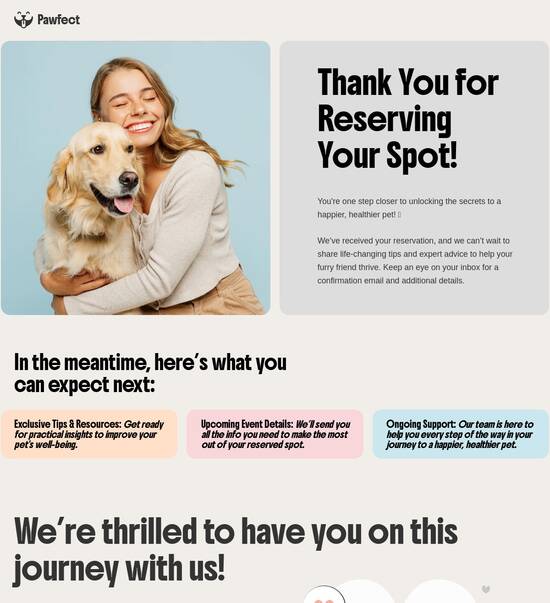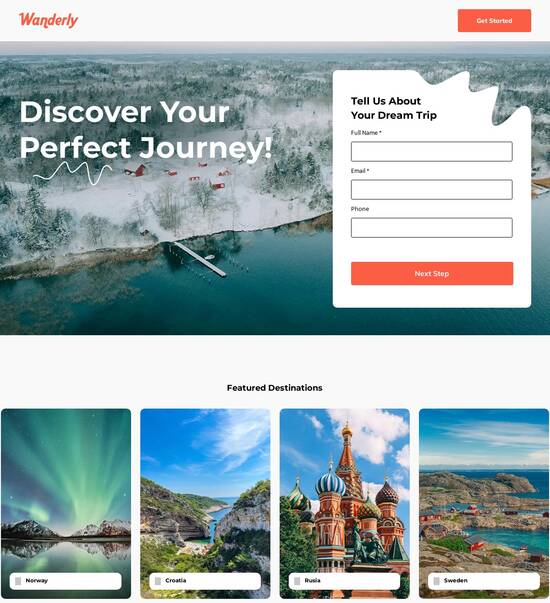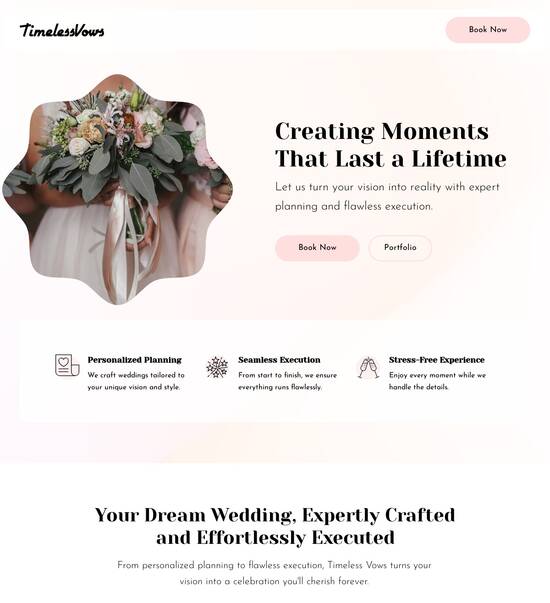
React.js optimized advertisement page template
Explore Similar TemplatesAbout template
Supercharge your advertisement page with React.js for outstanding performance! Learn more today.
Recommended templates

Easy to build without coding
With the intuitive drag-and-drop builder, anyone on your team can create high-converting pages without any knowledge of code or design. Make enhancements to your landing page with custom widgets using Javascript, HTML/CSS, or third-party scripts.

Multiple layouts for any industry and goal
Select from 500+ landing page layouts built to boost conversions across industry-specific scenarios. Customize them by adjusting fonts, adding images, and generating on-brand content with the AI assistant. Quickly scale with Instablocks® and Global Blocks that you can save, reuse, and update globally.

Loads fast and looks polished on any device
Every template is responsive, which means they present professionally on any device and load blazingly fast with our Thor Render Engine. You can also power them up with Google AMP technology to deliver an unparalleled mobile experience and drive higher conversions.

Robust analytics & experimentation
Get real-time updates and reporting across all your devices, showing the number of visitors, conversions, cost-per-visitor, and cost-per-lead. Launch AI-powered experiments, run A/B tests, and use heatmaps to analyze user behavior, then optimize your landing page to maximize conversions.







Easy to build without coding
With the intuitive drag-and-drop builder, anyone on your team can create high-converting pages without any knowledge of code or design. Make enhancements to your landing page with custom widgets using Javascript, HTML/CSS, or third-party scripts.
Multiple layouts for any industry and goal
Select from 500+ landing page layouts built to boost conversions across industry-specific scenarios. Customize them by adjusting fonts, adding images, and generating on-brand content with the AI assistant. Quickly scale with Instablocks® and Global Blocks that you can save, reuse, and update globally.
Loads fast and looks polished on any device
Every template is responsive, which means they present professionally on any device and load blazingly fast with our Thor Render Engine.
Robust analytics & experimentation
Get real-time updates and reporting across all your devices, showing the number of visitors, conversions, cost-per-visitor, and cost-per-lead. Launch AI-powered experiments, run A/B tests, and use heatmaps to analyze user behavior, then optimize your landing page to maximize conversions.
All the features you need to build lead-generating landing pages
Explore more featuresLearn how to build top-performing landing pages for any goal
FAQs
Leading the way in building high-performing landing pages





Creating a High-Converting Landing Page with Instapage
Instapage offers an intuitive solution for marketers seeking to maximize the ROI of their digital campaigns through high-converting landing pages. By leveraging Instapage, businesses across various verticals—including tech, financial services, and education—can create optimized landing pages that drive lead generation and conversions effortlessly.
Understanding the Importance of Landing Pages
Landing pages serve as critical touchpoints in any digital marketing strategy. They are designed specifically to encourage visitors to take a desired action, such as signing up for a newsletter, requesting a demo, or making a purchase. Effective landing pages lead to measurable results, optimizing your marketing campaigns. The right tool makes all the difference.
- High-Quality Templates: Instapage provides over 100 high-converting templates designed to suit various industries and marketing goals. Each template is purpose-built for efficiency and effectiveness.
- Built-In A/B Testing: With Instapage, you can conduct A/B tests without coding skills. This feature allows you to make informed decisions about layout changes and content strategies.
- Personalization Features: Customize landing pages for different audience segments using dynamic text replacement. This increases engagement by presenting visitors with relevant information.
Step 1: Choose a Template
Begin with Instapage's extensive library of templates. Select one that aligns with your campaign objective. Consider your target audience and what will resonate with them.
Step 2: Customize Your Landing Page
Personalization is essential. Leverage the intuitive drag-and-drop builder to create a unique experience.
- Add Dynamic Text: Use dynamic text replacement to personalize headlines or offers based on the visitor’s previous interactions.
- Utilize Instablocks: Insert Instablocks for reusable content sections across different pages, saving time and effort.
- Incorporate Calls-to-Action: Ensure your page clearly guides users on the desired action, such as ‘Sign Up Now’ or ‘Get Your Free Trial’.
Step 3: Optimize for Performance
Once your page is designed, it’s crucial to monitor its performance. Use built-in analytics and heatmap tools.
- Analyze Visitor Behavior: Use heatmaps to understand how users interact with your landing page, highlighting areas of interest and engagement.
- Track Key Metrics: Focus on metrics such as bounce rate, conversion rate, and average time spent on the page to gauge effectiveness.
- Iterate Based on Data: Adjust content and layout based on performance metrics to constantly improve your landing page's conversion potential.
In conclusion, creating an effective landing page using Instapage is both streamlined and data-driven, allowing marketers to enhance their campaigns successfully.
Ready to elevate your digital marketing efforts? Start using Instapage to create high-converting landing pages today!
ReactJS optimized advertisement page template
The evolution of advertisement pages in the digital era
As marketing technologies advance, the landscape of advertisement pages has transformed significantly. The traditional static web pages lacked interactivity and personalization, often leading to lower engagement rates. However, with the increasing expectations of users for instant gratification, there has been a substantial shift to dynamic content. This allows brands to deliver tailored messages that resonate with individual preferences and behaviors.
Optimized landing pages are no longer just an advantage; they are essential for converting visitors into customers. When users encounter well-designed pages that load quickly and speak directly to their needs, they are far more likely to complete a desired action, such as signing up for a newsletter or making a purchase. ReactJS has emerged as a powerful tool in this transition, providing developers the framework needed to create highly optimized advertisement page templates that enhance user experience.
With its component-based architecture, React allows for rapid development and seamless integration of interactive elements, making it a game-changer for modern advertising strategies. Combining efficiency with flexibility, ReactJS has positioned itself as an essential tool in the marketer's arsenal.
Understanding the core elements of a ReactJS optimized advertisement page
At the heart of a successful ReactJS advertisement page lies its core framework, which encourages flexibility and scalability. React's component architecture allows developers to break down complex interfaces into manageable parts, making it easier to maintain and update. Template files in ReactJS bring significant benefits, including enabling teams to create reusable components that preserve consistency across landing pages. This means marketers can deploy various advertisement strategies without starting from scratch each time.
Several popular portfolio templates specifically designed for advertisement pages are available in the React ecosystem. These templates often come with pre-defined layouts, typography, and design elements optimized for conversion rates. For instance, templates from libraries like React Bootstrap and Material-UI provide a solid foundation, allowing developers to focus on customization and functionality rather than design from the ground up.
Key functionalities of optimized templates
Real-time previews
These empower marketers to see changes instantly, allowing for agile adjustments to content and design.
Dynamic content loading
This feature enables personalized user experiences by tailoring content to individual visitors based on their behavior.
Efficient state management
Using React Hooks and Context API helps manage complex state across components easily, ensuring a smooth user experience.
Innovative technologies utilized in ReactJS advertisement templates
The effectiveness of a ReactJS advertisement page is enhanced through the integration of various JavaScript libraries and frameworks. UI libraries such as Material-UI and Ant Design can be easily incorporated into React applications, offering pre-designed components that align with the latest design trends and usability principles. This saves developers time and resources while enabling them to maintain a high standard of aesthetics and functionality across the board.
Additionally, using CSS-in-JS libraries like Styled-Components allows developers to manage component styling efficiently, ensuring that styles are scoped correctly and reducing the risk of conflicts. Coupling these technologies creates a robust development environment that caters to both design and performance requirements.
APIs and user data management
Effective advertisement pages must also prioritize data management and user preferences. Fetching data from external APIs enhances the dynamism of landing pages, allowing real-time updates to product listings, promotional offers, and more. This integration keeps your content fresh and engages users with information that matters to them at any moment.
Local storage can also play a crucial role in retaining user preferences, enabling personalized experiences even after users leave and return to the page. This feature boosts user satisfaction and helps build a loyal customer base.
Headless CMS: an emerging trend in content management
The rise of headless CMS has transformed how content is managed in advertisement pages. By decoupling the content management system from the presentation layer, marketers can utilize a more flexible approach to deliver content-driven pages. This architecture provides a streamlined way to manage content updates without the need for constant developer input, facilitating faster campaign iterations.
Furthermore, a headless CMS allows for improved scalability, as it can serve multiple front-end applications while maintaining a single source of truth for content. This ensures consistency and brand integrity across various channels, making it easier to engage diverse audiences.
The power of community collaboration in template development
The React community stands out for its cooperative spirit and innovative approaches to problem-solving. Engaging with these developer communities can yield considerable benefits in crafting effective advertisement page templates. Open-source collaboration fosters an environment where feedback can lead to significant improvements in template design and functionality. By sharing their work on platforms like GitHub, developers can enable others to contribute and refine ideas continuously.
Moreover, peer-to-peer learning strategies, such as participating in hackathons or meetups, allow developers to share knowledge and gather insights from experienced professionals. These environments encourage creativity and inspire new approaches to developing and optimizing ReactJS advertisement templates.
The importance of location-based customization
In an increasingly globalized world, geo-targeting strategies have never been more important. Tailoring content to user locations enhances relevance, ensuring that advertisements resonate with users based on their region. By using geolocation APIs, developers can dynamically alter content on a per-user basis, contributing to a personalized browsing experience.
Additionally, implementing internationalization (i18n) caters to diverse audiences, allowing brands to reach customers in their preferred languages and formats. However, this approach does come with challenges, such as the need for appropriate content management strategies to handle multiple languages effectively. Ensuring consistency while addressing regional specifics is vital in providing a seamless user experience.
Streamlining development with team collaboration tools
With a focus on efficiency and collaboration, development teams can leverage version control systems such as Git. This allows for meticulous tracking of template file versions and facilitates coordination among team members, ensuring that everyone is in sync with changes and progress. Maintaining a history of changes enables easier troubleshooting and rollback when necessary, further enhancing development workflows.
Incorporating agile methodologies into the development cycle can lead to significant improvements as well. By organizing work into sprints, teams can iterate and secure feedback at regular intervals. This adaptive planning fosters an environment where teams can consistently refine their ReactJS advertisement templates based on real-user interactions and analytic data.
Communication tools that boost team engagement
Utilizing platforms like Slack, Discord, or Trello can greatly enhance team communication and coordination. These tools allow team members to share insights, discuss challenges, and project manage effectively in real-time. Equipping teams with the right collaboration software not only ensures productivity but also promotes a culture of openness, making it easier to develop high-performing advertisement page templates.
Measuring success: key metrics for advertisement page optimization
To determine the effectiveness of advertisement pages built with ReactJS, marketers need to focus on critical user engagement metrics. Click-through rates (CTR) provide a clear understanding of how users are interacting with content. High CTR signifies that the advertisement is successfully attracting attention, while a low rate may indicate a need for design or messaging revisions.
Conversion rates are the ultimate success indicators, showing how many users complete the desired actions on an advertisement page. To optimize these metrics, collecting and analyzing user data is essential. Implementing analytics tools such as Google Analytics or Mixpanel allows marketers to gain valuable insights into user behavior, which can inform future optimizations.
A/B testing
Experimenting with different template designs and content can uncover what resonates most effectively with users.
User session recordings
These provide insights into how users navigate the advertisement page, highlighting potential friction points.
Heatmaps
Detailed heatmaps display on-page behavior, illustrating where users are clicking or scrolling, informing adjustments.
Anticipating future trends in advertisement page templates
As technology continues to evolve, the realm of advertisement page templates will also advance. The integration of AI and machine learning will revolutionize personalization. These technologies can predict user needs and preferences, enabling advertisers to serve hyper-targeted content that increases engagement and conversions.
Another trend to watch is the merging of static and dynamic content. Developing hybrid templates that adapt to user behaviors can create a more tailored marketing strategy. This approach will allow brands to maintain control over core messaging while also delivering personalized experiences.
Sustainability in web development
Organizations are increasingly prioritizing eco-friendly practices, prompting a shift in how landing pages are designed and hosted.
Increased focus on speed and performance
Fast-loading pages will continue to be critical as user expectations rise.
Greater emphasis on diversity in design
Inclusivity in landing pages will broaden the audience reach and improve overall user experience.
Leveraging user feedback and iteration for continuous improvement
Post-launch user insights are invaluable for refining advertisement pages. Marketers should actively seek feedback through surveys and user feedback forms. This information can reveal user perceptions and pain points, guiding future adjustments to template design and functionality.
Developing lead user groups can further enhance the refinement process. By establishing early access programs, engaged communities can provide real-time feedback on upcoming features, allowing developers to make informed iterations before broader rollouts.
Case studies: successful implementations and lessons learned
Analyzing successful implementations of ReactJS advertisement templates can provide powerful insights. By profiling brands that effectively utilize these frameworks, marketers can learn best practices and avoid common pitfalls. These case studies serve as educational references and can inspire new strategies for enhanced advertising results.
Building a portfolio of high-performing ReactJS advertisement page templates
Creating a strong portfolio showcasing sample projects and case studies allows developers to demonstrate their capabilities in building effective advertisement pages. Highlighting best practices and noteworthy achievements provides potential clients with confidence in your skills and understanding of best practices.
Utilizing platforms like Behance and Dribbble effectively showcases your work to a broader audience. By strategically displaying your projects, you can connect with potential clients, broaden your network, and generate new business opportunities.
Networking through showcase events
Attending conferences and expos focused on marketing technology and web development allows for critical networking opportunities. Engaging with industry professionals can lead to collaborations and partnerships, fostering mutual growth.
These events also provide a platform to learn about the latest trends and technologies in ReactJS advertisement templates, ensuring you stay ahead of the curve in a fast-paced environment.
Ready to skyrocket conversions?
Supercharge your ad campaigns with high-performing landing pages
Get started














